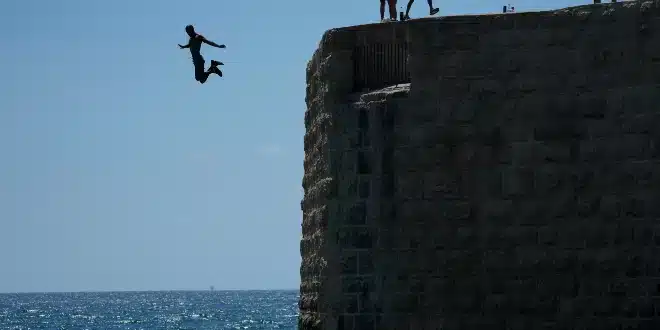In Beirut, shops remain open and traffic is as congested as ever. In Tel Aviv, cafes are bustling with customers and crowded beaches are dotted with umbrellas.
Despite these seemingly normal scenes, the region is teetering on the brink of all-out war, creating an undercurrent of fear and anxiety. After nearly 10 months of daily border skirmishes, distant strikes, and escalating threats, a sense of fatalism has settled in.
The recent assassinations of two militant leaders in Beirut and Tehran, attributed to Israel, have provoked vows of revenge from Iran and Hezbollah. There is a widespread expectation that any all-out conflict would be far more devastating than past confrontations, including the 2006 war between Israel and Hezbollah.
In Nahariya, a coastal town in Israel just 6 kilometers south of Lebanon, residents were lounging at the beach and surfers were catching waves despite the tension. Shauli Jan, a resident, noted that while the area was “tense,” people continued their daily routines despite frequent air raid sirens. He chose to visit the beach as usual, expressing a preference for political solutions over war.
In Beirut, about 110 kilometers to the north, life continues even in Dahiyeh, a neighborhood housing many of Hezbollah’s political and security operations, which was struck by an Israeli airstrike last week, killing Hezbollah commander Fouad Shukur and six others. Despite the area’s devastation during the 2006 war, and Israel’s warnings of future destruction, some residents like 75-year-old Khalil Nassar vow to stay put, displaying Lebanese, Palestinian, and Hezbollah flags in solidarity.
Authorities on both sides have not issued evacuation or preparation orders, even as several countries have issued travel warnings and many airlines have suspended flights. In Israel, the military has not released special guidelines or warnings, allowing daily life to continue relatively normally with full grocery shelves and ongoing summer activities.
Rear Adm. Daniel Hagari, Israel’s chief military spokesperson, assured the public that there was no change in defensive policies, emphasizing readiness for defense in all areas.
In April, after an Israeli strike in Syria killed two Iranian generals, Iran launched an unprecedented direct attack on Israel, firing around 300 ballistic missiles and drones, most of which were intercepted by international forces.
In Tel Aviv, real estate worker Elad Karta chose to visit the beach with his family, prioritizing normalcy despite uncertainty. He and his wife considered but ultimately decided against stocking up on emergency supplies.
Hezbollah legislator Amin Sherri mentioned that Lebanon has an emergency plan and sufficient fuel and medicine to last two to four months in case of war. Caretaker Health Minister Firas Abiad received 32 tons of medical supplies from the World Health Organization on Monday.
Countries like the United States, Britain, France, and Canada have urged their citizens to exercise caution or leave the region. Many airlines have canceled flights to Lebanon and Israel, causing crowding as travelers rebook. Expatriates in Lebanon for the summer are cutting their trips short, resulting in packed departure terminals at Beirut’s Rafik Hariri International Airport.
In Beirut’s Dahiyeh neighborhood, life goes on even around the site of last Tuesday’s Israeli airstrike. Hezbollah has vowed to retaliate but has not specified how or when. Saad Baydoun, whose shops and apartment were damaged in the strike, emphasized that while Israel wants war, he and others do not, drawing a comparison to the suffering in Gaza.
In Tel Aviv, life continues near Dizengoff Square with patrons visiting boutiques and ice cream shops. Tim Pshshinski, a recent military service completer, summed up the prevailing sentiment: “Life must continue, and there’s not much else we can do.”


